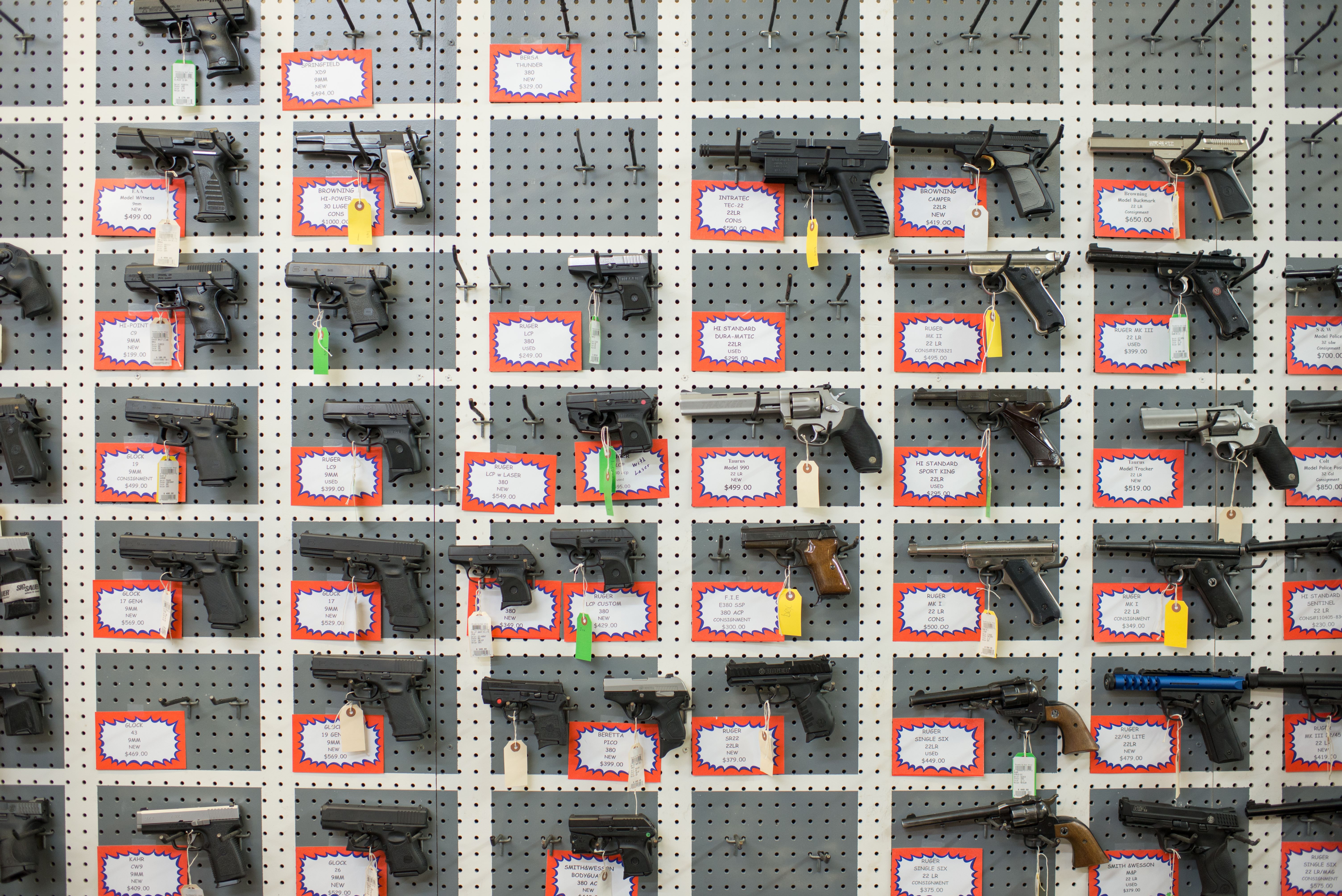The big problem with liberal solutions to America's horrible gun violence problem
They channel anger at the NRA — but do they actually tackle the underlying problem?


To hear some politicians tell it, the only thing standing in the way of preventing tragedies such as the Oregon community college massacre is the zealots of the National Rifle Association.
Were it not for the NRA and its money, the argument runs, Congress would do the right thing and stop the easy access to guns. Republicans in particular "wage a right-wing ideological crusade fashioned by the National Rifle Association and Gun Owners of America," according to Senate Minority Leader Harry Reid. (Can you believe the NRA considered endorsing Reid just five years ago?)
But the growing gulf between what liberals appear to believe drives the country's problem with gun violence and the measures they are openly proposing to solve it suggests they realize that there is more to it than the gun lobby's intransigence.
The Week
Escape your echo chamber. Get the facts behind the news, plus analysis from multiple perspectives.

Sign up for The Week's Free Newsletters
From our morning news briefing to a weekly Good News Newsletter, get the best of The Week delivered directly to your inbox.
From our morning news briefing to a weekly Good News Newsletter, get the best of The Week delivered directly to your inbox.
The implication of recent comments by President Obama and Hillary Clinton isn't simply that we have too few gun control laws, although they do contend that explicitly. It is that America has too many guns.
Some of their grassroots supporters say it out loud. At Vox, Dylan Matthews writes that "large-scale confiscation [looks] like easily the most promising approach for bringing U.S. gun homicides down to European rates." MoveOn.org circulated a petition to repeal the Second Amendment. The liberal writer Amanda Marcotte averred in Rolling Stone that the amendment "was written by slaveholders before we had electricity" and that its enthusiasts should "feel free to live in a powdered wig and shit in a chamberpot while trying to survive off what you can kill with an 18th century musket."
Many identify Australia and Great Britain, countries where there are sweeping restrictions on private firearms ownership, as models for the U.S. to follow on gun control. Yet Obama and Clinton actually propose little more than expanded background checks, something that won't put a dent in our vast supply of guns.
Before its vaunted 1996 law that instigated a buyback of hundreds of thousands of firearms and severely restricted their possession, Australia had a personal gun ownership rate of only about 7 percent compared to 34 percent in the contemporary United States. Even if gun control down under had been effective, which is a matter of some debate, it is of limited applicability to America. Indeed, a Harvard study frequently cited in support of the Australian law says in its conclusion, "It does not appear that the Australian experience with gun buybacks is fully replicable in the United States."
A free daily email with the biggest news stories of the day – and the best features from TheWeek.com
There has always been a culture war element to the American gun control debate. Cities in blue states with tough gun laws nevertheless have high rates of gun crime, while well-armed rural citizens where the laws are lax — such as Bernie Sanders' Vermont — enjoy relatively low rates of crime. The hope is that imposing stricter gun controls on the latter will reduce the supply available to the former.
The horrors of recent mass shooting episodes have at least some liberals contemplating a more direct challenge to America's gun culture. Their politicians may share their anger, but they don't yet share their enthusiasm for such a quixotic quest.
Background checks and assault weapons bans are practically the only viable gun control measures not because of the NRA's money or power but because of the high number of guns in the United States, the very fact that proponents who would like to go further lament.
Gun buybacks are unlikely to work. Confiscation would pose serious constitutional problems to the Fourth Amendment as well as the Second. The 300 million guns already here and the significant private demand for weapons would make for a potent black market. And the political resistance that tougher gun control would face comes from a large number of engaged gun owners for whom this is a salient issue, not just nefarious groups seeking to organize them.
Far too many people have lost their lives due to guns. The seeming frequency of mass shootings makes a desire for easy fixes understandable, as is the anger and frustration that makes polemicists on behalf of gun control tire of hearing pro-gun counterarguments. But neither the sincerity of those feelings nor the seriousness of the underlying problem obviate the obligation to spell out what policies are really being proposed here and marshal evidence that they will actually work.
W. James Antle III is the politics editor of the Washington Examiner, the former editor of The American Conservative, and author of Devouring Freedom: Can Big Government Ever Be Stopped?.
-
 Must-see bookshops around the UK
Must-see bookshops around the UKThe Week Recommends Lose yourself in beautiful surroundings, whiling away the hours looking for a good book
-
 A Nipah virus outbreak in India has brought back Covid-era surveillance
A Nipah virus outbreak in India has brought back Covid-era surveillanceUnder the radar The disease can spread through animals and humans
-
 Nasa’s new dark matter map
Nasa’s new dark matter mapUnder the Radar High-resolution images may help scientists understand the ‘gravitational scaffolding into which everything else falls and is built into galaxies’
-
 The billionaires’ wealth tax: a catastrophe for California?
The billionaires’ wealth tax: a catastrophe for California?Talking Point Peter Thiel and Larry Page preparing to change state residency
-
 Bari Weiss’ ‘60 Minutes’ scandal is about more than one report
Bari Weiss’ ‘60 Minutes’ scandal is about more than one reportIN THE SPOTLIGHT By blocking an approved segment on a controversial prison holding US deportees in El Salvador, the editor-in-chief of CBS News has become the main story
-
 Has Zohran Mamdani shown the Democrats how to win again?
Has Zohran Mamdani shown the Democrats how to win again?Today’s Big Question New York City mayoral election touted as victory for left-wing populists but moderate centrist wins elsewhere present more complex path for Democratic Party
-
 Millions turn out for anti-Trump ‘No Kings’ rallies
Millions turn out for anti-Trump ‘No Kings’ ralliesSpeed Read An estimated 7 million people participated, 2 million more than at the first ‘No Kings’ protest in June
-
 Ghislaine Maxwell: angling for a Trump pardon
Ghislaine Maxwell: angling for a Trump pardonTalking Point Convicted sex trafficker's testimony could shed new light on president's links to Jeffrey Epstein
-
 The last words and final moments of 40 presidents
The last words and final moments of 40 presidentsThe Explainer Some are eloquent quotes worthy of the holders of the highest office in the nation, and others... aren't
-
 The JFK files: the truth at last?
The JFK files: the truth at last?In The Spotlight More than 64,000 previously classified documents relating the 1963 assassination of John F. Kennedy have been released by the Trump administration
-
 'Seriously, not literally': how should the world take Donald Trump?
'Seriously, not literally': how should the world take Donald Trump?Today's big question White House rhetoric and reality look likely to become increasingly blurred
